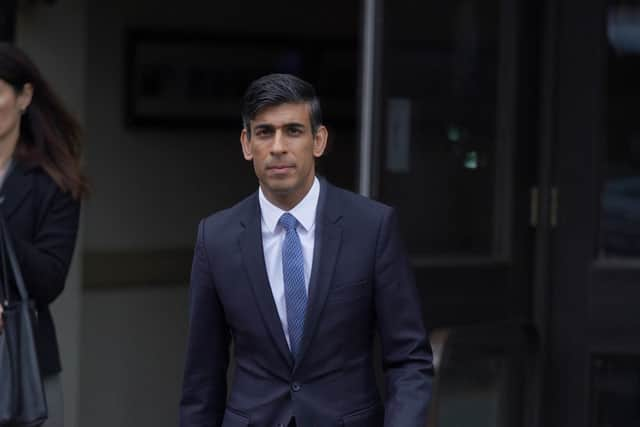Pandora Papers raise questions about UK's complicity in offshore tax havens – Martyn McLaughlin
At a time of unprecedented peacetime state borrowing in the midst of the coronavirus pandemic, the drip feed of revelations so far – and there is plenty more yet to come – will rightly leave people feeling angry.
But the huge leak of millions of documents, emails, and spreadsheets exposes more than the shadow economy utilised by the super-rich to hide and increase their wealth. It confirms how countries like the UK continue to actively facilitate the entire process.
Advertisement
Hide AdAdvertisement
Hide AdThe focus so far has been on high-profile individuals such as Tony Blair, King Abdullah II bin Al-Hussein of Jordan, and Mohamed Amersi, the prominent Tory donor. Fundamentally, however, stories such as the Pandora Papers are about governance – or the lack of it – in developed, modern economies.
Behind nearly every significant transaction laid bare in the offshore leaks is a network of enablers who make it possible. From law firms and accountants through to banks and company service providers, there is a thriving – and lucrative – industry in place.
The majority of this white-collar workforce is law abiding and simply tries to exploit loopholes in the system to ensure their clients get the most out of their assets and pay the minimum tax possible; having offshore assets is not illegal in and of itself, and those who make use of the structures can have legitimate privacy or security concerns for doing so.
But the same system is the ideal conduit for those who wish to loot public assets and move dirty money across borders. A minority of those professional enablers make it all possible.
This is not idle supposition. It is a fact, laid out in black and white by the Treasury and the Home Office in their most recent national risk assessment of money laundering and terrorist financing, published in December.


The report warned that while there was a “medium” risk of the property market being exploited for money laundering back in 2017, the risk is now considered to be “high”. Similarly, the risk posed by the use of crypto-assets, trust and company service providers, and estate agency businesses for money laundering, has also shot up.
“Large amounts of criminal funds, often the proceeds of serious fraud or overseas corruption, continue to be laundered through the UK financial, professional services sectors and UK-registered corporate structures,” the report stated.
“The global nature of the financial system is exploited, often transferring funds through complex corporate vehicles and multiple offshore jurisdictions in order to hide the true beneficiary of the funds. This is regularly – wittingly or unwittingly – facilitated by professional services providers such as accountants, lawyers and trust and company service providers.”
Advertisement
Hide AdAdvertisement
Hide AdIt is impossible to know for sure the sums of money involved, but the Treasury and the Home Office believe it could amount to hundreds of billions of pounds a year. At a time when the UK’s public finances are crippled, it is a staggering amount.
Only last month, meanwhile, the Office for Professional Body Anti-Money Laundering Supervision, part of the Financial Conduct Authority, reported that there are “significant weaknesses” in how professional body supervisors meet money laundering regulations.
What makes this all the more galling is how little has been done to try and stamp it out. It is now more than five years since the leak of the Panama Papers, which detailed hundreds of thousands of offshore companies set up by the law firm Mossack Fonseca – more than half were registered in the British Virgin Islands, a British overseas territory.
In its aftermath, David Cameron’s Conservative government announced the start of a “co-ordinated, ambitious global effort to defeat corruption”. The progress on that front by successive Tory administrations has been glacial.
In July 2018, the government published its draft Registration of Overseas Entities Bill, which is designed to prevent the owners of UK property assets from concealing their identity behind anonymous offshore firms. More than three years on, it appears to have been mislaid somewhere between the Commons and the Lords.
Similarly, the government has talked a good game about wide-ranging reforms to Companies House so as to verify the identity of directors and beneficial owners, but there is no timescale for the changes, and criminals and pranksters alike continue to game the system. A cursory search through the publicly available register of officers, for instance, would have you believe that Donald Trump is the director of an Edinburgh pub.
In the meantime, further leaks have laid bare how the UK, and London in particular, has become a money-laundering hub. The release last year of the FinCEN files, for example, shone an unforgiving light on how the UK’s lax company formation laws make it possible for nondescript office buildings to serve as thoroughfares for international financial crime.
The Pandora Papers, like that leak and others before it, will herald familiar calls for change. The problem is that there are too many individuals and institutions who are willing to turn a blind eye.
Advertisement
Hide AdAdvertisement
Hide AdThe fact that Rishi Sunak has breezily dismissed the issue as a “global problem”, and hailed the way in which the UK has “led the world” on tax transparency, does not give much hope. Such hubris belies the lack of political will to tackle the problem. Pandora’s box is well and truly open.
A message from the editor:
Thank you for reading this article. We're more reliant on your support than ever as the shift in consumer habits brought about by coronavirus impacts our advertisers. If you haven't already, please consider supporting our trusted, fact-checked journalism by taking out a digital subscription.
Comments
Want to join the conversation? Please or to comment on this article.
